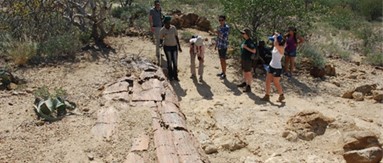
Course Summary
How can understanding the past and the present help us shape our future? What role will you play in responding to the numerous environmental, political, and social challenges of our time? Develop your skills as an active global citizen with our BSc in Humanitarian Archaeology. This cutting-edge, practical degree will enable you to become an archaeologist with the skills to tackle some of the biggest humanitarian issues affecting global society in the 21st century. You will explore how conflict, genocide, human evolution, identity, and climate change have shaped the world in which we live and how society has responded to these challenges throughout human history. You will participate in unique fieldwork opportunities throughout your studies that will teach you the practical and digital skills that archaeologists use to document landscapes and analyse material culture. And you will learn how to assist in social action agendas, build community cohesion, and contribute to the physical and mental well-being of others using archaeological approaches
The BSc (Hons) in Humanitarian Archaeology is a unique and diverse programme which offers you the opportunity to: (i) gain detailed knowledge about how conflict, genocide, climate change and culture have shaped societies and the environment; (ii) learn about the methods that archaeologists use to document landscapes and material culture, advance social action and contribute to physical and mental well-being; (iii) develop and apply practical skills during annual fieldwork opportunities, including international fieldwork in your second year; (iv) tailor your learning through chosen pathways; (v) complete a detailed research project relating to one of your pathway choices and/or interests; (vi) undertake interdisciplinary studies taught by specialists in Archaeology, History, International Relations, Geography, Media and Film, Forensic Science, and Law. You can also choose to take a placement year to make this a four-year course.
This course is ideal for those who have an interest in archaeological practice, human rights, genocide and conflict studies, social justice, forensic investigation, and geography. You will engage with the many of the critical debates that currently affect our global community such as:
• The complexity of human identity from prehistory to the present
• Evidence for the current climate crisis
• The reasoning, methods, and aftermaths of conflict; ranging from interpersonal violence to acts of genocide
• You will also develop the skills needed to communicate with a range of stakeholders, including the public and critical decision-makers.
In Year 2 there will be a substantive overseas field school to Africa or the Global South region where you will engage with communities and individuals who are at the forefront of adapting to the climate crisis, conflict, or other humanitarian concerns. We will help you develop an understanding of how learning about the past can help shape the future, and equip you with the skills you need to pursue a career in a wide range of fields, including archaeology, human rights work, Non-Government Agencies, education, policy development, and heritage management.
Course Details
Modules
Level 4: Introduction to Humanitarian Archaeology, Planet Earth, Archaeology of Conflict & Genocide, Community Archaeology, Archaeological Practice and Archaeological Field School.
Level 5: Research Skills, International Fieldwork, Mass Death Scenarios, Climate and Environmental Change, Identity and the Archaeological Record, Contemporary Debates in Humanitarian Archaeology, Environmental Hazards (optional module), Gender History and Sexual Politics (optional module), International Society (optional module), Researching the Climate Crisis (optional module), Conversation and Environment (optional module), Forensic Archaeology (optional module).
Level 6: Humanitarian Archaeology Dissertation, Digital Archaeology, Archaeology of the Holocaust, Creating Climate Resilient Societies, Archaeology and Activism, Film, Archive, and Heritage (optional module), Environmental Issues and the Media (optional module), People, Technology, and Place (optional module), Techniques in the Identification of Human Remains (optional module), Human Rights in Global Security (optional module), Nomads, Tribal Groups, and the State (optional module), Expert Witness and the Legal System (optional module), International Human Rights (optional module), Ice Age Britain (optional module), Archaeology and Colonialism (optional module)
If you choose to study our placement year, the Level 6 modules above will be taken in Year 4 of your studies.
Assessment Method
Assessments for the core modules will include, but not limited to, the following:
• Poster Presentations
• Written Assessments (Essays)
• Written Assessments (Reports)
• Practical Examinations and Reflections
• Digital Assessments • Dissertation
How to apply
You should apply for the course on UCAS by 25th January 2023.
This is the deadline for applications to be completed and sent for this course. If the university or college still has places available you can apply after this date, but your application is not guaranteed to be considered.
Application Codes
Course code: VV17 (Full Time, 3 years) or VV18 (Full Time with Placement Year, 4 years)
Institution code: S72
Campus name: Staffordshire University (Stoke Campus)
Points of Entry
The following entry points are available for this course: Year 1
Entry requirements
Qualification Requirements
- UCAS Tariff – 112 – 120 points
- A level – BBC
- Pearson BTEC Level 3 National Extended Diploma (first teaching from September 2016) – DMM
- Access to HE Diploma
- Scottish Higher
- OCR Cambridge Technical Extended Diploma – DMM
- T Level – Pass (C and above)
